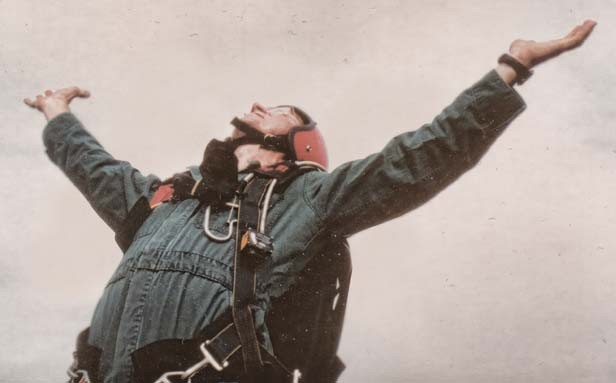Grover Everett had at least one James Bond moment.
It came at a Lincoln air show in 1988, while Everett was still in his skydiving phase. He was second in line, jumping right after someone who was going to display an American flag during the descent while a plane flew nearby in salute. Someone apparently forgot to tell the pilot of that plane that there would be two jumpers.
WHAM!
The plane hit Everett’s parachute when he pulled the ripcord at 3,800 feet – he later recalled seeing the plane veer away from him, engine roaring, in the seconds before impact. Parachute cords tangled around an ankle while the collapsed canopy fluttered uselessly above. He was upside down and in a death spin toward earth.
Everett couldn’t pull his reserve until he got rid of the main chute; otherwise, the two parachutes would tangle, and he did not have a third, nor much time. Using the heel of one foot, he tried pushing his shoe off, thinking the cords would come off with his shoe. The shoe stayed put, but the cords eventually broke free, allowing Everett to pull his reserve and float into a cornfield while watching an ambulance on the ground race toward him.
“He never panicked,” recalls his wife, Patricia. “No matter what happened, he would stop and figure out the best way to take care of it.”
After the mishap, Everett, who was then 46, did what he always did: He put his parachute in a trailer he towed behind his bicycle and rode home. He gave up skydiving not long afterward, his wife says, but he never gave up his bicycle.
Everett died doing what he loved. Less than two weeks after his 71st birthday, the retired state prison guard was riding on Illinois 104 near Auburn when a motorist drifted off the road and struck him – a moment of inattention at just the wrong spot.
“The ambulance called it in as a 55-year-old man,” Patricia says.
Everett was a legend in local cycling circles. You have to go back to 2007 to find someone in the Springfield Bicycle Club who logged more miles in a year than Everett, who topped out at 18,638 miles in 2008, an average of more than 50 miles a day – the runner-up that year rode less than half that much. He was shooting for 20,000 miles this year.
Everett was known as a savvy rider who always wore a helmet and didn’t dawdle on a modern-day Cannondale equipped with an old-school leather saddle. He competed against himself, not anyone else, his wife said, and set goals at the beginning of each year.
“I had met an incredible cyclist,” wrote a much younger bicyclist from Marion who had heard about Everett and finally went on a 70-mile ride with him last June that he memorialized on a cycling blog. “The pace was high enough that I didn’t offer to play license plate bingo along the way with Grover. I just pedaled.”
Like most riders, Everett had his share of falls, some more serious than others, especially given that he had osteoporosis, which causes bones to easily fracture. During a ride in Wisconsin, he went down after hitting another bicycle. It was a 10-mile ride to the hospital, where doctors found a broken scapula, some fractured ribs and a punctured lung.
“He said he had a little difficulty breathing before he got there,” Patricia recalls.
All his life, Everett stayed in shape. As young man, he yearned to play football but was too small, so he took up trampoline, becoming skilled enough to perform with a traveling squad. Weight lifting was a passion, and he won a national championship in 1972, raising 290 pounds in the clean-and-jerk portion of the competition. Everett weighed less than 150 and stood five feet five inches tall.
“He didn’t go for body building, he went for strength,” his wife says.
Everett, who routinely rode from Taylorville to Springfield for doctor appointments, was the sort who did things until his body overruled his will. He was an avid swimmer, once stroking across Lake Shelbyville simply to realize a goal, until a shoulder problem forced him out of the water. He ran eight miles a day until his knees couldn’t take it anymore. He eventually had a knee replacement as well as a partial hip replacement. He took up cycling in a serious way after he could no longer run.
Everett rode more than 3,000 miles from Seattle to Atlantic City in 1989, the year after he almost met his end at the Lincoln air show. He loved pedaling on less-ambitious trips lasting a week or so. He was a quiet man, but he could tell you what people are really like – the ferryman who refused payment after making a special trip across the Mississippi when Everett missed the boat, the stranger who insisted that he sleep in her garage when she found out he planned to camp that night. There is something disarming about a man on a bicycle loaded with tent, sleeping bag, spare clothes and cook stove, and Everett, who favored fluorescent riding garb, was often that man.
Patricia didn’t share her husband’s passion for cycling. He once bought her a bicycle, but she wasn’t accustomed to hand-operated brakes and promptly crashed. She never got back on, but she never stopped her husband, even though she said she sometimes worried.
“I knew there was a possibility,” Patricia says. “When the phone rings and he’s a little late, you always hate to pick up the phone. You can’t tell someone to stop doing something because you’re afraid.”
–Bruce Rushton


